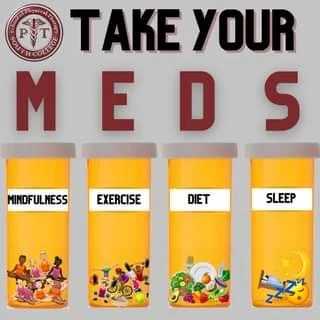The Best M.E.D.S.
In today’s world, death related to noncommunicable diseases make up the majority of deaths each year. Think cardiovascular disease, respiratory disease, and diabetes, yet these are mostly preventable through lifestyle modifications. Unfortunately, COVID brought that to light in the worst way. People with those underlying disease got sicker, while those without did not, for the most part. Now, armed with that knowledge, it is our job to set ourselves up for healthy-living success in the future. We do that by modifying appropriate lifestyle factors and creating a resilient immune system, and therefore a resilient human.
Think of it like taking your meds. If a doctor told you “this pill will make you healthy and improve your quality of life and life expectancy” you would take it, right? Well, here are your M.E.D.S.:
M-mindfulness
Mindfulness calls you to bring awareness to your present experiences and release thoughts about the past and future. This can include breathing strategies, meditation, yoga, journaling, body scans, and spending time in nature. Check out this 10 minute body scan that you can do sitting or lying down. Research is showing that mindfulness combined with exercise results in the most stress reduction. We all can use a little less stress, right?
E-exercise
Physical activity improves cardio-respiratory fitness, cognitive function and cardiovascular disease, reduces all-cause mortality, and adds meaningful years to your life. All individuals can benefit from increased exercise and movement, as most individuals don’t even come close to meeting the minimal physical activity guidelines. If you are unsure where to start, musculoskeletal practitioners have the necessary knowledge to get you on a path to fitness.
D-diet
Food is medicine. A diet rich in protein, vegetables, fruits, nuts, seeds, and unrefined carbohydrates and low in sugar, trans-fats, and refined carbohydrates is proven to improve mental strength, aid a healthy immune system, and ward off chronic, noncommunicable disease. Other positive effects include reduced body mass, improved energy balance, mood regulation, and overall physical performance. Making sure you are getting enough calories for an active lifestyle is very important. Remember, 1200 calories is the recommended amount for a toddler, not an active adult! Reach out to a nutritionist if you need help in this area.
S-sleep
Sleep is a vital part of your overall healthy well-being, and sometimes overlooked. Consistent sleep of 7 to 8 hours a night can help with tissue healing, decreased inflammation, improved immunity, and overall proper body function. Poor sleep is associated with increased risk of dementia, frailty, and even morbidity later in life. You can help improve your sleep hygiene by going to bed and waking up at the same time (yes, even on weekends), getting early morning and late afternoon sunlight exposure, meeting your physical activity requirements, reducing alcohol consumption, and reducing screen time in the late afternoon. There are many other ways to help with proper sleep without medication, so reach out to your musculoskeletal expert if you have concerns.
#TakeYourMEDS
Most people have one or two areas where they are doing alright. Focus on one additional area to improve upon and see if you can make it consistent, like if a doctor told you “this pill will make you live longer”, because it’s true. Taking these M.E.D.S. will help you live a longer, happier, fuller life. Woah, tall order, but there’s research to back it up!
Take your M.E.D.S. like your life depends on it, because it does!
Information for this post was synthesized from “Mindfulness, exercise, diet, and sleep - A necessary and urgently needed skill set of the musculoskeletal practitioner”. Thank you to the authors for access to this report: DOI: 10.1002/msc.1686

